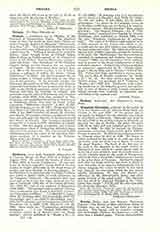

Urraburu, JUAN Jose, Scholastic philosopher, b. at Ceanuri, Biscay, May 23, 1844; d. at Burgos, August 13, 1904. He entered the Society of Jesus on May 3, 1860, at Loyola (Guipuzcoa). He was professor of rhetoric, and after having finished his own studies he taught philosophy in the Jesuit house of studies, and later theology at Poyanne, France. In the Scholastic revival promoted by Leo XIII, Urraburu was called to Rome (1878) to teach philosophy in the Gregorian University. He remained there nine years and on his return was made rector of the College of Valladolid (1887-90); of the Colegio Maximo, Ona (1891-97); and of the seminary of Salamanca (1898-1902). His principal work is entitled “Institutiones philosophiae quas Romae in Pontificia Universitate Gregoriana tradiderat…”, Valladolid: I, Logica, 1890; II, Ontologia, 1891; III, Cosmologia, 1892; IV, Psychologise part 1, op. 1894; V, Psychologise part 2, 1896; VI, Psychologise part 2 (continuation),1898; VII, Theodiceae vol. I, 1899; VIII, Theodiceae vol. II, 1900. Other works are: “Compendium philosophiae scholastic…”, 5 vols., Madrid, 1902-1904; “El verdadero puesto de la filosofia entre las demas ciencias”, articles published in “Razon y Fe”, I, XV.—1557, 137 (1901); “El principio vital y el materialismo ante la ciencia y la filosofia”, ibid., VIII, 313 (1904); IX, 180, 325 (1904) i X, 219 (1904); XI, 54 (1905); posthumous: “La mente de la Compania acerca de las doctrinal escolasticas que se refieren a la constitucion de los cuerpos. Plactica familiar” (Ona, printed privately). Two chapters (Disputat., XI) of “Psychologia fusior”, translated into Spanish by Antonio Madariaga, were published at Madrid, 1901, with the title “Principios fundamentales de antropologia”. The value of Urraburu’s philosophical work is fully attested by the favor with which it was received and the care with which it was examined by the most competent critics. The influence of his teaching has been notable, especially among the members of his order; the “Institutiones” has been constantly consulted by professors and students (new edition, “Logica”, 1908); the “Compendium” is the textbook used at present in the Jesuit scholasticates of Spain and other countries. Father Carlos Delmas published an exhaustive appreciation in the “Etudes bibliograph.”, March, 1893, and in “Etudes”, LXXXVIII, 123. Father Jose Espi contributed a serious study, “Un nuevo libro de filosofia escolastica” in “Razon y Fe”, IV, 51. To these articles may be added Nadal’s notice, “La psicologia del P. Urrlburu” in “Hazen y Fe”, XIV, 314. Urraburu’s work, a lasting monument to the School in general, and particularly to that of Suarez, is solid, learned, uncompromising towards error, moderate in expression, and well-balanced by common sense.
ANTONIO NADAL

